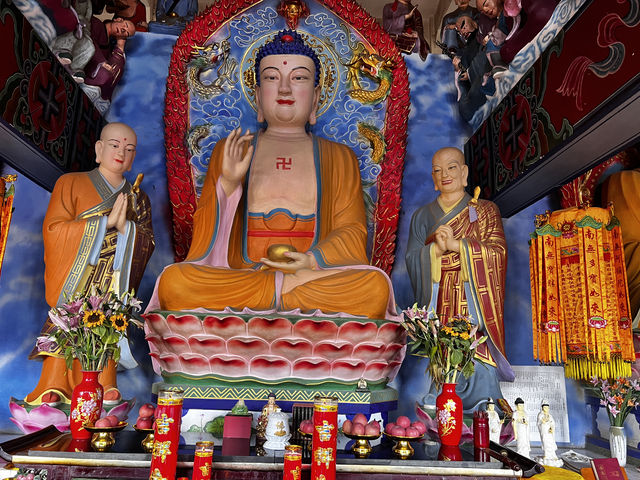Lufeng World Dinosaur Valley
AveloraQuintessa456#
Lianxiang Pass
OliviaPrice890&
The peach blossoms are blooming one after another
Sydnee Spinka
Chuxiong, Yunnan, is a hidden gem for travelers in Yunnan
HARRISON RUSSELL
Lufeng Dinosaur Valley
Ophelia_Blackwooden-66
Qian Nian Salt Well Heijing Ancient Town
OliverChamberlain58
Popular Trip Moments
Here are some suggestions for friends who are thinking of traveling to Yunnan recently | The tranquil and deserted Lianxiang Pass fades from its former bustle | Lufeng World Dinosaur Valley | Lianxiang Pass | The peach blossoms are blooming one after another | Yunnan has another super niche and low-key ancient town worth visiting—Heijing Ancient Town | Chuxiong, Yunnan, is a hidden gem for travelers in Yunnan | Lufeng Dinosaur Valley | Qian Nian Salt Well Heijing Ancient Town | Lufeng World Dinosaur Valley Hot Spring Hotel, a five-star experience you deserve! | Travel through a thousand years to the ancient town with Chinese style | Heijing Ancient Town | Kunming Surroundings|Direct access by green-skin train, a low-key ancient town of a thousand years is explored like this | The temple of Baiyi Nunnery in Lufeng County, Yunnan | Lost in the castle of time: Lianxiang Pass (Part I) | The Castle Lost in Time: Lianxiang Pass (Part 2) | Chuxiong: I booked the World Dinosaur Valley Hot Spring Hotel, which includes
Popular Destinations
Fujian Travel | Vienna Travel | Venice Travel | Surat Thani Travel | Sungai Golok Travel | Miyako Travel | Wuhan Travel | Lahore Travel | Melk Travel | Changsha Travel | Antalya Travel | Budha Basoda Travel | Harbin Travel | Guangzhou Travel | Santa Maria Travel | Benxi Travel | Dongxing Travel | Kaifeng Travel | Old Harbour Travel | Belyaevo Travel | Newton and Noss Travel | Huta-Studenets'ka Travel | Yang Tha Chang Travel | Itutinga Travel | Bhusni Travel | TT. Neo Travel | Mereti Travel | Alfredo Marcondes Travel | Sturt Vale Travel
Recommended Attractions at Popular Destinations
Bangkok attraction near me | Tokyo attraction near me | Manila attraction near me | Hong Kong attraction near me | Taipei attraction near me | Seoul attraction near me | Los Angeles attraction near me | New York attraction near me | Shanghai attraction near me | Kuala Lumpur attraction near me | Shenzhen attraction near me | Osaka attraction near me | Singapore attraction near me | London attraction near me | Guangzhou attraction near me | San Francisco attraction near me | Beijing attraction near me | Macau attraction near me | Bali attraction near me | Paris attraction near me | Ho Chi Minh City attraction near me | Orlando attraction near me | Jakarta attraction near me | Phuket attraction near me | Chicago attraction near me | Toronto attraction near me | Fukuoka attraction near me | Istanbul attraction near me | Dallas attraction near me | Cebu attraction near me
Popular Attractions
Guangzhou Tower Ferris Wheel | Shenzhen Ping An Financial Center Yunji Sightseeing | Shanghai Science and Technology Museum | Venice Town | Ashikaga Flower Park | "The Song of Everlasting Sorrow" | Dalian Haichang Discoveryland Theme Park | Mount Huangshan | Thousand Island Lake | Happy Valley Beijing | Fuguo Sea World | Shanghai Ocean Aquarium | Shenyang Fantawild Adventure | Hong Kong Observation Wheel | Momchilovtsi Herb Garden | Bamboo Rafting on the Li River in Xingping | Dubai Miracle Garden | Sage Studio Spa | Carrarese's Castle of Padua | WuXi XinTianDi DongYa GuoJi FengQing Jie | Wakebeach 257 - Wakeboard & Waterski Dormagen | Xiaolongchi Sceneic Area | Tsugaru Country Club Hyakuzawa Course | Tuscany Ride a Bike | St Paul Curling Club | Bodegas Mar De Frades | Bush Baby Calls | Similan Islands | Shanghai Maglev Train | Water Cube (National Aquatics Center)
Popular Restaurants in Lufeng
Jiahuabingwu (lufeng) | 禄康云鳟鱼庄(新禧大街店) | 恐龙谷餐厅 | Liushunju Restaurant | 绝味鸭脖(恐龙山店) | JUE WEI YA BO | 正新鸡排·炸鸡烧烤(佳越店) | 袍哥纸上烤鱼 | (恐龙山服务区)餐厅 | 火焰烧烤 | 腊排骨火锅店 | 传品汉堡 | 蓝色木瓜脆皮酸汤火锅(德源野生菌交易市场店) | eden甜品 | 千味坊私房菜馆 | 桃花岛农庄 | 宜膳康天麻肚子鸡 | 会友堂 | 天天杀猪饭(禄丰康宁医院店) | 野菌园 | 天龙食府 | 爱客99家常菜 | 版纳傣味烧烤(禄丰店) | CHUAN WEI YUAN CAN GUAN | 禄丰菌乡四季生态美食汇 | 红丁王野生菌宴 | 嘉州飘香串串香火锅 | 彝掌柜柒零酸汤火锅店 | 冰雪世界冷饮批发部 | 泸州苦笋鸡(广通店)
Payment Methods
Our Partners
Copyright © 2024 Trip.com Travel Singapore Pte. Ltd. All rights reserved
Site Operator: Trip.com Travel Singapore Pte. Ltd.
Site Operator: Trip.com Travel Singapore Pte. Ltd.





















